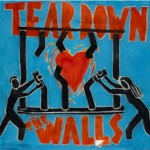 Discussion Paper for “Tear Down the Walls” Conference in Support Of P.P. and P.O.W.’s In The U.S., and Those Held in Cuba
Discussion Paper for “Tear Down the Walls” Conference in Support Of P.P. and P.O.W.’s In The U.S., and Those Held in Cuba
If ever the time seemed right for reappraisal of American foreign policy that moment has now arrived. But with the sound and fury of blind patriotism ringing loudly, it is brutally clear that the “other side” may never be heard. At times such as this, we must find our collective voice and aggressively challenge the country’s attempt to force its potent brand of self-righteousness on the rest of the world.
No doubt, America feels her greatest contribution to world civilization will be the agency of globalization – a “New World Order” concept that dates back to Teddy Roosevelt’s League of Nations. This concept festered until the establishment of the United Nations, and now since September 11th., the call is at fever pitch.
But what about the “the other side” of September 11th.? The crisis could just as easily conjure up a second round of internments in concentration camps or as equally easy call forth violent retribution to any not affected with enough star-spangled patriotism. Such bold strokes are not unimaginable, but we must not fear. We must seize the moment and demand that this country acknowledge its wrongs even while it is in the midst of committing new ones. We must call for a RECONCILIATION TRIBUNAL because for too long America has punished the innocent and cannot be allowed to escape accountability, because “fanatics are no better than terrorists!”.
As long as no real decisions are reached over the defined terms of exactly what constitutes a terrorist act, this country will continue to be a breeding ground for right-wing fanatics who smuggle out of Congress a blood-based rhetoric that aims to destroy anything or anyone it cannot control. Never one to telegraph his punches, Bush is intent on fanning the flames and expanding the psychological occupation of the minds of the American public by increasing the pressure upon them to believe that everything that is not Eurocentric is dangerous.
Many public officials will maintain that this new terrorist agenda that the Bush government -both past and present- is pushing all over the globe is less a conventional war than it is a rounding up of all terrorism’s poster children; although it is a common White House refrain, it must be advocated that a domestic policy of a similar nature is a kissing cousin to the one being globally negotiated. And guess what? When Dubya chooses to clean out the terrorist infrastructure at home, the incursions will start inside the prisons! We’re such easy pickings, and since we are already under siege, and without International protections, we can be eliminated without any cautions having to be taken. Imagine how easy a task it would be for them to dispose of us, and at some undefined time the Oval Office will commit themselves to just such a search-and-destroy mission.
As a safeguard there is no choice but to push the issue of Political Prisoners, Prisoners of War, and Politicized Political Prisoners because it would be a grave mistake if we failed to comprehend this clear and present danger, and then refused to act.
What now follows is no emotional statement. Rather, it is the “P.O.W. Doctrine”, a stark creed of insistence that we deserve the international protections of the Geneva Convention. There is, as of now no time for social arguments or internal debates. We demand action, and our urgency is reinforced by George W. Bush’s push for world domination. Through him, we are acquainted with our own Axis of Evil.
Should International Law Be a Protection For The Status Of Politicized Political Prisoners In The Black Liberation Movement In America?
In order to acquaint you with the status of P.P.P.’s, a definition is necessary, and it is our long-held belief that a P.P.P. is a prisoner whose initial arrest was for criminal, and personal objectives, whose state of mind at the time of his arrest was void of political consciousness and/or organizational commitment.
However, following his confinement, such an individual becomes exposed and predisposed to political refinement to such a degree that he is transformed into a loyalist to the struggle of the people. It must be noted here that the loyalty espoused by the prisoner is not the simple expression of sympathy, or the slightly more diplomatic inclusion into a cadre. His/her’s is a raw conversion as political as the system. This conversion is due to the exposure of the prisoner to the political, social, and religious repression by the State and the Government in the forms of racism, capitalism, and fascism; Thus the prisoner becomes politicized/activated to his responsibility for atonement, rectification, and participation in the ongoing Struggle.
Needless to say, as retaliation for this life-altering conversion, the P.P.P. will become the preferred target of the Prison/Industrial Complex based on this newly evolved commitment of activism and revolutionary social change via the State and Government by virtue of his/her commitment and work as he/she transforms him/herself and others recruited into the Struggle cadre to effect change in the system. The P.P.P. is targeted by the prison state directly by the abusive power; Covertly, internally, as well as eternally by the government’s Cointelpro. [i.e., E1 Hajj Malik Shabazz, George Jackson, Ahmed Evans, etc.].
As result a result, the P.P.P finds him/herself in something of a quandary because he/she is a dissident cut adrift from any of the basic protections of International Law and, this is the typical atmosphere that spurs on the repressions of the Bureau of prisons, (“B.O.P.”), or State-sponsored machinery to use the full range of their immense powers to crush the P.P.P.
In many ways the P.P.P. suffered more than the Political Prisoner (“P.P.”), and the Prisoner of War (“P.O.W.”). Basically they exist without the possibility of protections of International Law, and generally they are not part of an external organizational base. And so, the government in its retaliation to these comrades for their actions and beliefs uses the prison system as its instrument to isolate them for their continuous success in shaping the minds, the wills, and the politics of the masses. Unless our movements create organizational bases for these comrades, an important ingredient in demanding international protection will be lost.
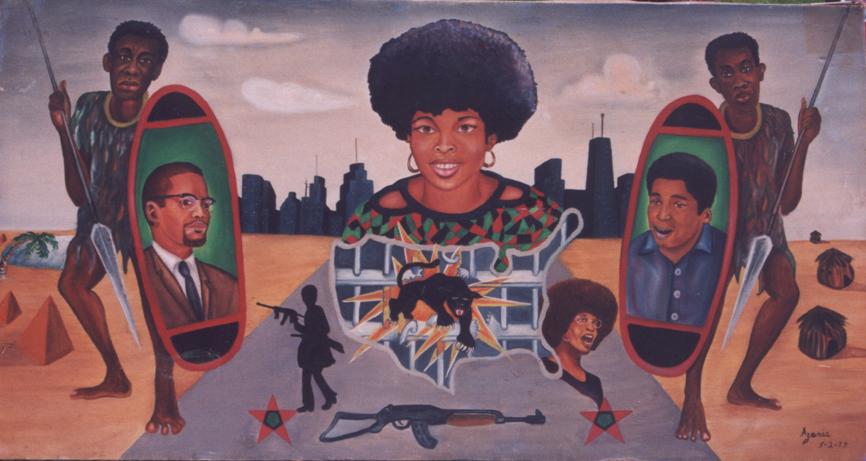
Zolo Azania is an accomplished artist despite his incarceration. Here he depicts Black Warriors including Assata Shakur (center).
The criteria for establishing status to prisoners must be that prisoner’s relationship to a movement and/or organization on the National/International Theater. [i.e., Ruchel McGee, Akil A1-Junde, Hugo Pinell, Jatir, Zola Azania, etc.]
Now, after conveying that information, I think it would be best if I went to the question of precisely how this P.P.P. certification should occur. Routinely, there are two (2) levels where the certification would prove politically valid.
(1) The movement in general must establish a certification process, but more importantly there has to be, firstly, a critically objective assessment of the status of the certification to our Struggle. (This is necessary to resolve and eliminate any internal disputes which could breed an atmosphere for Cointelpro).
(2) Upon the establishment of a certification process, our movement must conduct a world-wide search of conflicts to find the applicable parallel on an international level to support the recognition of the P.P.P.’s.
IN THIS PERIOD, IS THE PRISON/INDUSTRIAL COMPLEX -BY VIRTUE OF THE PRISON SYSTEM’S HISTORICAL ROLE IN REPRESSION -AN EXTENSION OF OUR STRUGGLE, AND IF SO, WHAT ARE THE INSTRUMENTS OF INTERNATIONAL LAW THAT PROTECT POLITICAL
Sources indicate three(3) categories of International Law that will support the certification of P.P.P’s these being namely:
(1) The Geneva Convention
(2) Protocol I
(3) The Political Offense Exception
Each of these international instruments of law deliver a statement central to the premise that P.P.P.’s can achieve protections under the crystal clear laws of them either singly or combined. It bolsters our contention that P.P.P ‘s due to their sincerely held political beliefs, can partner in the protection of international Law in the same way as P.O.W ‘s, and P.P. ‘s applying an evolved analysis and tactic.
Accordingly, let’s study these three instruments in brief:
(A) Geneva Convention of 1949 defined the P.O.W. and their treatment during that time.
PROTOCOL
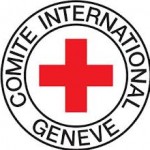 In 1977, additional protocols to the Geneva Convention were adopted to reflect the character of guerilla warfare practiced by national liberation movements. The Preamble to the Protocol I states:
In 1977, additional protocols to the Geneva Convention were adopted to reflect the character of guerilla warfare practiced by national liberation movements. The Preamble to the Protocol I states:
Reaffirming further that the provisions of the Geneva Convention of August 12, 1949, and of the protocol must be fully applied in all circumstances to all persons who are protected by those instruments, without any adverse distinctions based on the nature or origin of the armed conflict or on the causes espoused by or attributed to the Parties to the conflict.
A person who takes part in hostilities and falls into the power of the adverse Party shall be presumed to be a prisoner of war, and therefore shall be protected by the Third Convention, if he claims the status of prisoner of war, or if he claims such status by notification to the detaining power or to the Protecting Power. Should any doubt arise as to whether any such person is entitled to the status of prisoner of war, he shall continue to have such status and, therefore, be protected by the Third Convention and this Protocol until such time as his status has been determined by a competent tribunal.
If a person has fallen into the power of an adverse Party, is not held as a prisoner of war, and is to be tried by that Party for an offense arising out of the hostilities, he shall have the right to assert his entitlement to prisoner of war status before a judicial tribunal and to have that question adjudicated. Whenever possible under the applicable procedure, this adjudication shall occur before the trial for the offense [i.e., domestic trial].
Protocol One
The many internal armed conflicts since 1949 have highlighted the deficiency in common Article III and illustrated the need to develop new rules for regulating internal armed conflict. From 1974 to 1977, 124 states, 50 non-governmental organizations, and 11 national liberation movements participated in one or more of the four diplomatic conferences that produced the two PROTOCOLS added to the Geneva Convention on the 12th of August, 1949. Protocol I was intended to update the law of war regulating international armed conflict between states. PROTOCOL II was adopted to regulate internal armed conflicts. Both PROTOCOL I and II were accepted by the Executive Branch of the United States until the Reagan Administration.
On December 8, 1978, The General Assembly enacted Resolution 33/24, entitled Importance of the universal realization for the right of the peoples to self-determination and the speedy granting of independence to colonial countries and people for the effective guarantee and observance of human rights, wherein it states:
“The General Assembly …reaffirms the legitimacy of the struggle of peoples for independence, territorial integrity, national unity and liberation from colonial domination and foreign occupation by all means available, particularly armed struggle.” [Emphasis added]
1. CAPTURED ANTI-COLONIAL FIGHTERS ARE ENTITLED TO THE POLITICAL STATURE OF ‘PRISONER OF WAR’ AND THE PROTECTIONS OF THE GENEVA CONVENTIONS.
2. The armed struggle of people against colonial and racist regimes are to be regarded as international armed conflicts in the sense of the 1949 Geneva Conventions, and the legal status envisaged to apply to persons engages in armed struggle against colonial and alien domination and racist regimes.
3. The violation of the legal status of the combatants struggling against colonial and alien domination and racist regimes in the course of armed conflicts entails full responsibility in accordance with the norms of International Law.
Militia Members Organized Resistance
(A) That of conducting their operations in accordance with the laws and customs of war.
(B) Member who professes allegiance to a government or authority not recognized by the detaining power.
(C) Inhabitants of now-occupied territory who on the approach of the enemy spontaneously take up arms to resist the invading forces having at times to form themselves into regular armed units provide they carry arms opening and respect the laws and customs of war.
How does this help the P.P.P. question? It’s where the combatant becomes aware and pledges allegiance to the cause of taking up arms against an invading force that distinguishably separates the P.P.P. from the non-combatants. (i.e., Ruchell Magee, Attica Brothers.)
P.O.E.E.
The Court in Quinn traced the history of the political offense exception and noted that it emanated from the belief that individuals have the right to resort to political activism for political change. The Court stated that “political crimes” have a greater legitimacy than common crimes internal to prison and external to activism.
According to the Quinn Court, there are two (2) distinct categories of political offenses: pure political offenses, and “relative political offenses”.
Pure political offense are aimed directly at the government and have none of the elements of ordinary crimes. These offenses which include treason, sedition, espionage, do not violate the rights of individuals. Because they are frequently specifically excluded from the list of extraditable crimes in a treaty, courts seldom deal with whether these offenses are extraditable, and it is generally agreed that they are not.
The definitional problems focus around the second category of political offenses — the relative political offenses. These include “otherwise common crimes committed in connection with a political act, “or common crimes… committed for political motives or in a political context. Quinn v. Robinson, supra, at 793-794.
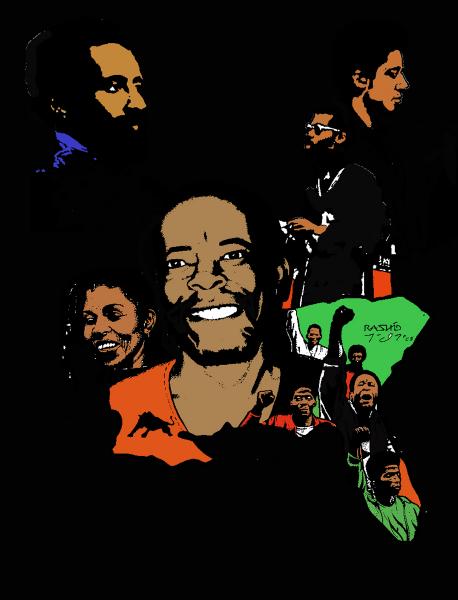
“Lessons from the New Afrikan Liberation Front (NALF) for Black Power, Land and Independence,” featuring Sundiata Acoli & Assata Shakur – Art: prisoner artist Rashid Johnson
Second, it is clear that throughout the history of New Afrikan presence in America, there have been consistent rebellions, uprisings and varying levels of violent political turmoil arising from New Afrikan resistance struggle across the American Empire (U.S.A.) . This is particularly true of the struggle of the 1960’s up to and through the period today. Urban rebellions, attacks on police, financial institutions, narcotics enterprises, and armed self-defense in the face of police attacks, and radical violence were common place during this period. As previously noted, the B.L.A. was credited with a number of armed attacks and the overground military formations of the New Afrikan Independence Movement (“N.A.I.M.”) involved in a number of acts of armed self-defense. During the period of the offenses alleged in my case (Brinks), Black urban rebellions occurred two or three times in Miami, one in Chattanooga, Tennessee, and inside Pontiac Prison in Michigan, and inside numerous other prisons (i.e., Lucasville).
The Quinn case moreover points out that the an uprising group does not have to have political structure, and that a person not a member of a group might through parallel or supportive activities act in furtherance of an uprising.* Consequently, there is no need for a prisoner such as myself, Dr. Shakur, to testify with regard to membership in an uprising group like the B.L.A. in order for the political character of the charged acts to be established. For the P.P.P. to have to be a member of a party or organization his/her acts must further support the organizations goals.
Political offense exception developed within the extradition context as a standard for evaluating the acts charged in this certification.
The International tests that establish the political offense exception are used to distinguish common from political crimes.
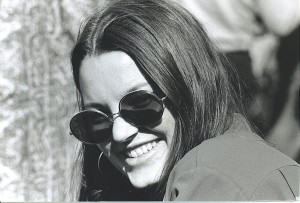
Marilyn Buck, Dr. Shakur’s co-defendant
In 1986 for example, in my case, U.S.A vs. Shakur et. al, and Marilyn Buck, in the 2nd. Circuit Southern District of New York, we presented a motion contending that the acts charged in the indictments are political acts which are not properly the subject of criminal prosecution. I contended that under applicable treaties and International Law that I was a Prisoner of War. One of the International Instruments that was relevant was the defining acts charged in the indictment as political and not R.I.C.O.. We profit the P.O.E.E. analysis as…
(A) International Law applicable to Domestic Courts.
(B) That P.O.E.E. provided International and Domestic standards upon which acts charged in the indictment could be determined to be political.
(C) That it could provide a method upon which an individual can be determined to qualify for the protection of the various International Law instruments.
The court at that time, although asking the right questions came to the conclusion that juries could not determine violations or application of International Law with respect to Domestic charges; different than what happened in Seattle in 1998, involving Ground Zero-D59-Trident Nuclear Submarine Case.
The Trident Ground Zero D50 Nuclear Submarine Case was a demonstration against nuclear weapons, specifically Trident Submarine and nuclear war which the defendant deemed a violation of International Law and crimes against peace, and crimes against humanity. They believed that the Hague Convention of 1977 was the International Law that protected their rights. July 6,1996, the International Court of Justice deemed that the development and deployment was a violation of International Law. The Nuremberg Principals required individual and organized action of said proliferation and development. These instruments are also considered in the P.O.E.E. analysis.
The Judge’s instructions went on to say that Congress alone has the ability to abrogate treaty law, and that where there is a conflict between a right granted or duty imposed by International Law or treaty, and a local, state, or federal law, the right granted or duty imposed by treaty or international law shall govern. Nuremberg in effect says that “silence is complicity”, therefore not only giving the right to engage in non-violent acts of dissent, but also the duty to engage in such acts.
These analogs are very much applicable to P.O.W.’s, P.P.P.’s and P.P.’s. P.O.E.E. standards IN THE TRUTH AND RECONCILIATION COMMITTEE IN SOUTH AFRICA, CHAIRED by Desmond Tutu, which was formed to develop a method for creating amnesty in South Africa.
The task was to balance the latitude of an open-ended concept of amnesty with specific limiting criteria, so that while any conflict and everybody could come into the process,* it was not a blanket amnesty without standards. For this purpose, the act adopts the principal defining the concept of a political offense drafted by Carl Agage Norgard, a Danish national President of the European Commission on Human rights, for use in the 1989 settlement in Namibia that foreshadowed events in South Africa. These principals require an examination of the: 1) motivation of offender; 2) circumstances; 3) nature of the political objective; 4) legal and factual nature of the offense; 5) object (state vs. private entity); and finally 6) relationship between the offense and the political objective, its directness or proportionality.
Clearly the same standards/criteria presented by the B.L.A. for the application of P.O.W.’s and P.P.’s in the United States by way of the P.O.E.E. analysis presented in 1986 in our case became the formula by which a great battle for justice and self-determination which took place in South Africa, in a search for resolution of that conflict, of the internal nature the P.O.E.E. analysis, used in the internal conflict between state and the people as a method of qualifying and certifying the distinction between political crimes and social crimes. These above examples should make our movement keenly aware that there are definitely instruments upon which to research for the qualifying of P.P.’s, P.O.W.’s, and P.P.P.’s in our movement, and should be applied internationally.
In re Doherty, 599 F.Supp. 270, 275 (S.D.N.Y. 1984) elaborated a more flexible standard for applying the political offense exception. It stated:
The court rejects the notion that the political offense exception is limited to actual armed insurrections or more traditional and overt military hostilities. The lessons of recent history demonstrate that political struggles have been commenced and effectively carried out by armed guerillas long before they were able to mount armies in the field. It is not for the courts, in defining the parameters of the political offense exception, to regard as dispositive factors such as the likelihood that a politically dissident group will succeed, or the ability of that group to effect changes in government by means other than violence, although conceded such factors may at times be relevant in distinguishing between the common criminal and the political offender. Nor is the fact that violence is used in itself dispositive. (Instead the court must assess the nature of the act. the context in which it is committed, the status of the party committing the act, the nature of organization on whose behalf it is committed, and the particularized circumstance of the place where the act takes place.)
The political offense exception is not merely a narrowly specialized concept used in extradition and deportation proceedings, but rather incorporates a fundamental principle that a person should not face a criminal trial for offense that are essentially political.
Accepting the premise that the prisoner has been certified as part of a movement and the prison setting is part of the movement, that said prisoner responds to the oppression and functions in an organized group or aids the goals of that movement, we should argue that the above stated instruments are applicable to our P.O.W.’s, P.P.’s, and P.P.P.’s.
The argument of our movements responsibility to P.P.’s, and P.O.W.’s, or lack thereof binds the internal struggle of the proper recognition of P.P.P ‘s left unsupported by our organizations and movement, and while we struggle to make aware the existence of P.P.’s, and P.O.W.’s in the United States, we support that argument by way of International Laws and various Instruments in establishing (1) a criteria, and (2) satisfying the required principle internally, we must apply the same method for qualifying P.P.P.’s, and P.O.E.E ‘ s which require these standards in both categories.
An important step must also be made by our organizations and movements to (1) Officially include the United States prison system as a part of the battle field in our struggle such as what the Irish Republican Army (“I.R.A”) did in the early 70’s and 80’s. (2) We also must officially embrace the active P.P.P.’s into an organizational foundation that gives them and their work the proper recognition as provided and required under the International Instruments that best address our needs.
Essentially, the preceding information gives hard proof that P.P.P.’s can (and should) be certified under the same instruments that aid P.O.W.”s and P.P.’s, and given the unmistakable premise that prisons are a part of the government’s repressive regime against which the P.P.P. struggle, it should indeed be clear that the instruments of International Law are applicable. If by chance there is any lack of consensus about the government’s organized efforts to destroy prison struggles for human rights against genocide, I quote the following statement from Eric Holder, former Deputy Attorney General under Bill Clinton. The rhetoric (issued in response that the government ‘s pursuit of the death penalty in Zacarias Moussaoui’s case may be unconstitutional) states: “This is meant to send a signal to people who are in custody”. Holder stipulated further that “failure to cooperate is going to carry the ultimate sanction”, demonstrating the manipulation of law for political objectives.
This iron-fisted eagerness is not a last-minute threat to those in confinement as politically conscious prisoners have always been at risk, so this bad news is no “new” news, and if it must be spelled out, then I hazard to say that in prison, once a prisoner is politicized and draws his first wages he/she first struggles against the system -the prison administration- and there can never be a safe return to the sedentary existence of the mentally dead convict.
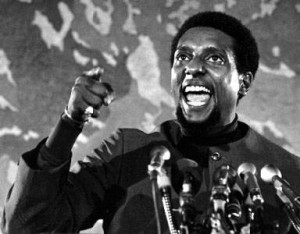
Geronimo ji-Jaga Pratt
No matter how it is viewed, those were no transparently disguised acts of aggression meted out to Brothers George Jackson, Malcolm X, Ahmed Evans, Ruchell Magee, Akil Al-Junde, Hugo Pinell, Zola Azania, Shaka-Sankofa, Attica Bros., etc.. Those that the prison/industrial complex didn’t assassinate, they bottled up as best they could to stifle them into sensory deprivation, mind altering medications, i.e., G. ji-Jaga Pratt, who served with honor.
Therefore, the obvious point must be made that the prison setting is a battleground, a part of the greater struggle for liberation. Who can argue that prisons are merely some lame government project funded to assist in rehabilitation? No, the prison system is the government’s booking agency and despite Capital Hill monologues, the joint is the ass-kicking road dog of the Justice Department, and for the record, the prison/industrial complex has more confirmed kills than C.I.A.
After dismissing all the permissiveness of the Due Process Clause, the P.P.P. has no foundation and can claim no retroactive application of International Law. They are defenseless. If it can be accepted that, historically, prisons are a legitimate arm of a repressive government, then why not consider the intensity of the P.P.P.’s plea for International protections? Because with notable exceptions, and often with a wink or a smile, the boot is forever ready to crush the neck of dissidents.
Overall the general sense of the P.P.P ‘s plight offers nothing to cheer about, and chances are the situation will not get any more endearing. But yet the P.P.P ‘s existential predicament remains. To what extent do we go to safeguard our comrades? Because as long as they remain “on the plantation”, they are jeopardized! Extraordinary measures, and a firm commitment must be taken in regards to the P.P.P. question. Not surprisingly, there is not much time.
DEFINITION OF TERRORISM
In applying the recognition of P.P.’s, P.O.W.’s by the use of the Geneva Convention, we accept that the argument of armed conflict is a part of the process of liberation. It is this point where all parties abide by the proper standards of war/conflict we must guard against, and never allow our actions to be labeled as terroristic.
That said, we must make clear what the international definition has been pre-September 11th, and how its been distorted by the United States as it is conceived in International Instruments pre-September 11th, and post-September 11th. brings on very important challenges in definition and evolution.
TERRORISM
The following definitions establish the minimum criteria used by the F.B.I. to determine if criminal acts should be labeled as acts of terrorism, which is not the definition under International Treaties and Laws.
Terrorism is the unlawful use of force or violence against civilian persons or property to intimidate or coerce the government, the civilian population, or any segment thereof, in the furtherance of political or social objectives. The F.B.I. defines two (2) categories of terrorism in the United States:
International Terrorism which involves terrorist activity by groups or individuals who are foreign-based and/or are directed by countries or groups outside the United States or whose activities transcend national boundaries; and
Domestic Terrorism which involves groups who are based and operate entirely within the United States and are directed at elements of our government or population without foreign direction. There are other examples of actions…
TERRORIST INCIDENT
A terrorist incident is a violent act or an act dangerous to human life in violation of the criminal laws of the United States or any state, to intimidate or coerce a government, the civilian population, or any segment thereof, in furtherance of political or social objectives. (Emphasis supplied).
Q. HAS THE UNITED STATES RAISED THE STATUS OF TERRORIST TO FREEDOM FIGHTER, OR HAS THE UNITED STATES LOWERED THE STATUS OF FREEDOM FIGHTER TO THE LEVEL OF TERRORIST?
A. It is submitted that in the affairs of a nation state no rule must be better established than that its laws are clear. How else can acts of wrongdoing be authenticated? This principle is universally adhered to, but within this country the determination of whether one is a terrorist or a freedom fighter is not exercised under the appropriate jurisprudence of Law, but rather by the dictates of whatever public officer is doing the talking at the moment. Such double standards are not a new concept since sufficient proof exists that the authority to mandate who was a freedom fighter and who was a terrorist dates back to the Indian Wars in this country. Whenever the Indians won a battle, the battle was reported as either a slaughter or a massacre, the highest evidence available that the “red savages” were terrorists. Nowhere in the annals of documented American history were the indigenous peoples who struggled valiantly against an invading force who sought, with the force of arms, to subdue and oppress them, recognized as freedom fighters.
Without such a rule of thumb, the right to interpose or juxtapose the two has rested upon the inquiry that presented itself at the time: the side with the most white people were freedom fighters. *(The fluctuating application of varied definitions of law applicable to captured Al Qaeda, Taliban, Domestic, and Foreign Nationals as well as the politically expedient labeling of Palestinians are revealing.) It was by this decree that the Ku Klux Klan (“K.K.K.”) was never labeled as terrorists even though the acts they wreaked upon an unarmed, non-threatening black population were clearly acts of terrorism even when the acts they perpetrated were deemed to be such by the Klan themselves. The K.K.K. vocally stated that their aim was to terrorize blacks away from the voting polls.
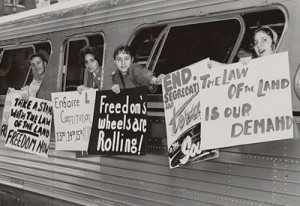 Contrast this with, the fact that in 1964 the human rights workers and Freedom Riders who traveled south to register blacks in Mississippi to vote, actually viewed themselves as fighters for freedom, but were never considered as such. In fact, they were historically viewed as southern invaders, terrorists of a sort, that deserved to die as James Cheney, Andrew Goodman, Mickey Schwerner did in Neshoba County, Mississippi.
Contrast this with, the fact that in 1964 the human rights workers and Freedom Riders who traveled south to register blacks in Mississippi to vote, actually viewed themselves as fighters for freedom, but were never considered as such. In fact, they were historically viewed as southern invaders, terrorists of a sort, that deserved to die as James Cheney, Andrew Goodman, Mickey Schwerner did in Neshoba County, Mississippi.
This dilemma that gives rise to the truth that rightly or wrongly gives authority to individuals to name themselves no longer exists. You are either a terrorist or a freedom fighter at the discretion of the prevailing powers. Despite the terrorist definition as authored by the F.B.I., the maxim carries no real clout since there is no mandated prohibition that deters the government from inserting, at will, either the label “terrorist” or “freedom fighter” on the military intercourse as it sees fit. With no fixed boundary, the F.B.I.’s definition is simply a national ornament that can either elevate or violate the modus operandi of the principle of warfare and applicable law.
Can it be denied that the roots of terrorism made its first appearance in this country during the Civil War when Union Generals targeted the farms, homes, and factories of southern civilians? Yet President Lincoln hailed the murderers as freedom fighters. And from this point onward, the American government from the Executive Office, through all the Brass in the military, down to the Politicos and citizens have succeeded in providing verbal asylum to unjustifiable atrocities by proclaiming who wears the mantle of freedom fighter or who bears the stigma of being branded a terrorist.
It would be wholly inconsistent to brand a man/woman a terrorist if he/she straps on dynamite and detonates him/herself in a crowded cafe. Basically his/hers military role is no different than that of Sherman tank since the strategy and objective is the same.
At the moment, the P.P.P., is the prime question of the liberation movement, and in the end will be the legacy of those of us who are forward-thinking enough to grasp the complexity of the issues. I, personally, make it no great secret that the most important facet of the argument is the question of a remedy, and the legal travails of this challenge must be addressed as a two-tiered proposal consisting of both a short-term and a long-term goal.
In keeping with the short-term prospective, we should emphatically demand an immediate end to the repression, oppression, and isolation of the P.P.P.’s, P.P.’s, and P.O.W.’s. And while it may be unlikely, presently, I strongly support the long-term prospect of calling amnesty for all P.P.P’s that our movement has certified. This second-tier agenda may prove to be the only one to reverse the course of repression that is so deeply ingrained in the prison/industrial complex, which is credited with being the Bully of the Justice Department.
It has been rumored in some political quarters that P.P.P.’s represent the “alterlife” of the movement, and since they served no role or active function within a formal infrastructure, they are nothing more than sympathizers. I beg to differ, and contest this distinction vehemently. P.P.P.’s are more than mere “Buddies” of the revolution and, despite the fact that they had/have no intimate contract with an organization outside, their politicization inside the prison complex is no less extraordinary than the commitment of those of us who converted on the outside. Without a doubt, P.P.P.’s are a formidable resource, and should not be mislabeled as “revolutionary imposters”, or treated as second-hand members of the movement. They are legitimate as long as their loyalty is unquestionable, but with a record number of P.P.P.’s their status grows increasingly more unpredictable. A generation ago fewer P.P.P.’s were in for the long haul and were twice as likely to abandon the Struggle after release. Many of these viewed the Struggle as revolutionary Chic, and pursued it as a fad. Whereas modern day P.P.P’s seem less daunted by the challenges and usually maintain a very high level of commitment throughout all periods of their confinement and even after their release.
For P.O.W.’s and Political Prisoners, the Geneva Convention’s Protocol’s is the Holy Grail, and the tenets of this International Instrument must be accorded to P.P.P.’s or else we will fail to boost the yield of the movements future full harvest. What really matters is that we bring our best and brightest minds to the movement, and then we protect them with all the resources at our disposal.
As long as the government is allowed to merchandise the terms “terrorist,” and “freedom fighter”, it will generally lower the status of a Freedom Fighter to that of a terrorist since governments are invested with ready-made punishments to deal with terrorists who are deemed to be nothing more than a modern day version of the pirates, and highway robbers of old. At the same time, America will still enjoy the privileges of the artificial exchange of status that exists between the terrorist/freedom fighter dilemma. Note the fact that in 1979 Osama bin Laden was labeled a Mujahedeen “Freedom Fighter” by the same government that now declares him a “cowardly terrorist.”
Our actions have clearly been in a retaliatory nature, expropriations are legitimate aspects of armed conflicts, defensive actions on the part of our forces, and fall clearly within the purview of justifiable armed actions, and under any standard, Pre and Post, the Geneva Accord of 1949 Protocol provides that it is the responsibility of every captured prisoner of war to make an attempt to escape. Every army around the world recognizes this basic principle. P.P.P.’s, P.P.’s and P.O.W.’s in their actions dedicated to the goals of the movement and Struggle are the requirements upon which standards of “International Law” require their recognition and protection.
Our movements is second to no other movements goal. We are not clear yet of what operational definition of the term terrorism signifies in the post 9-11 era. None of the agencies; F.B.I., Home Land Defense, State Department, the new emerging International Coalition, or even the United Nations have been definitive of their meaning. For example, co-architect of the International Coalition (U.S. and Britain) of the One World Order has tactically defined and labeled Prime Minister Robert Mugabe of Zimbabwe as a terrorist and a terrorist state based on the actions of the veterans of war who fought against the terrorist of Rhodesia who have yet to turn over land where three(3) percent of the white population control seventy (70) percent of the land. It is a clear indication that the term terrorist being used is selectively racial and bias to us as a people.
Our movement must operate on the United Nations definition which would seem to be more objective and stable in its use.
It is my intention to provide the organization of “The Tear Down The Wall Conference” in Cuba with a working document that aides the discussion for gathering support internationally for the release of P.P.’s, P.O.W.’s and certified P.P.P.’s in the United States. Its intention also to give our movement and international observers, an understanding of the standards we struggle with that should qualify an important aspect of our struggle, and should provide protection under “International Law” that we deem as important to the outcome of our Struggle.
It is also important to show, in my opinion, that we are not and won’t be paralyzed by the latest effort to imperialize the planet by “One World Order.”
Our Struggle, and the struggle in the Middle East have clearly different objectives, and we use different tactics. We are not to dictate how they relieve their suffering.
We make a moral and spiritual evaluation so that we are guided in our acts based on our principles. We come to the conclusion that oppression and genocide, that we as a people, must be dealt with for the survival of our future, and the recognition of the sacrifices of our Ancestors and Martyrs.
CONCLUSION
These issues are being presented obviously to further the discussion on the recognition of P.P.’s and P.O.W.’s in the United States. The question of P.P.P’s is very important. Clearly the debate within our movement [i.e., Black/New Afrikan Struggle] requires serious analysis and certification of all our comrades status and a clear definition of the next wave.
It is my opinion that in order for the P.P.P’s question to be answered we must fully understand why and how International Law requires our (P.P.’s and P.O.W.’s) certification. From this position we will be like the Formers of the Protocol of the 1970’s, who, of the National Liberation movement, were able to force the re-evaluation of the Geneva Accords to obtain recognition for ill-regular forces. We must forward the position that the prison system in America:
(A) has become a battlefield for human rights,
(B) is an enemy of self-determination,
(C) as well as the cornerstone for genocide in the United States
Prisons are in fact a place of struggle where International Law must accept and set standards for the proper recognition for those who struggle in that theater and accept that P.P.P.’s are a part of our Forces integral to our movement and strategy.
THE LAST WORD!
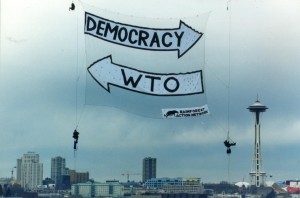
Anti-WTO Banner Drop in Seattle.
I conclude with an admonition not to overlook the threat presented by the World Trade Organization which is emerging as the world’s first global movement. Upon its inception in 1994, the interests of globalization has grown by leaps and bounds, but what has gone unnoticed is that the 134 nations that comprise the W.T.O. cannot exist without a global armed force and the recent 9-11-01 event has provided the global army the pretext needed to flex its military muscle. And now that the cuckoo has been sprung from the clock of the 21st. century imperialism, time will stand still as history is interrupted by militaristic coups and palace uprisings staged and engineered courtesy by those who sponsor globalization.
Without a doubt, once the world economy is globalized the gap between the haves and have-nots will widen and the expected collateral damage will be more violent incidents such as those of 9-11-01. This reality inescapable. A massive military of global proportions will invite so-called terrorist activities as powerless people will seek to dismantle this monstrosity by any means necessary, so it would be mindless to camouflage a terrorist act. By not being more demanding the people have collectively permitted secretive organizations like the World Bank (which are all dominated by the United States) to muster the strength to move beyond congressional oversight as well as checks and balances from any legislative body. We must not grant the government the power and/or ability to skirt the responsibility of explicitly defining a terrorist!
The right to struggle against oppression is as natural as breathing. We must at all costs prepare a better place for the next generation. Provide for a better state of mental and physical circumstances we experience today.
Stiff Resistance,
Dr. Mutulu Shakur
September/2002

 Discussion Paper for “Tear Down the Walls” Conference in Support Of P.P. and P.O.W.’s In The U.S., and Those Held in Cuba
Discussion Paper for “Tear Down the Walls” Conference in Support Of P.P. and P.O.W.’s In The U.S., and Those Held in Cuba
 In 1977, additional protocols to the Geneva Convention were adopted to reflect the character of guerilla warfare practiced by national liberation movements. The Preamble to the Protocol I states:
In 1977, additional protocols to the Geneva Convention were adopted to reflect the character of guerilla warfare practiced by national liberation movements. The Preamble to the Protocol I states:


 Contrast this with, the fact that in 1964 the human rights workers and Freedom Riders who traveled south to register blacks in Mississippi to vote, actually viewed themselves as fighters for freedom, but were never considered as such. In fact, they were historically viewed as southern invaders, terrorists of a sort, that deserved to die as James Cheney, Andrew Goodman, Mickey Schwerner did in Neshoba County, Mississippi.
Contrast this with, the fact that in 1964 the human rights workers and Freedom Riders who traveled south to register blacks in Mississippi to vote, actually viewed themselves as fighters for freedom, but were never considered as such. In fact, they were historically viewed as southern invaders, terrorists of a sort, that deserved to die as James Cheney, Andrew Goodman, Mickey Schwerner did in Neshoba County, Mississippi.
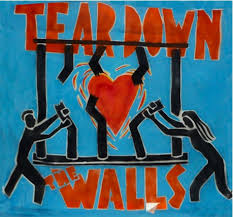 Statement for ‘Tear Down the Walls: The International Human Rights Conference on Winning Amnesty For U.S. Political Prisoners and POWs’
Statement for ‘Tear Down the Walls: The International Human Rights Conference on Winning Amnesty For U.S. Political Prisoners and POWs’